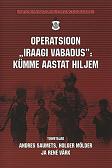ETNILIS-USULISTE VÄHEMUSTE OLUKORRAST IRAAGIS ENNE JA PÄRAST OPERATSIOONI "IRAAGI VABADUS"
THE SITUATION OF ETHNIC AND RELIGIOUS MINORITIES BEFORE AND AFTER OPERATION IRAQI FREEDOM
Author(s): Kuldar-Valdo Karula, Andres SaumetsSubject(s): Cultural Essay, Political Essay, Societal Essay
Published by: Kaitseväe Ühendatud Õppeasutused
Keywords: ethnic and religious minorities in Iraq; Kurds; Turkmen; Christians (Assyrians, Chaldeans); Yazidi; Mandeans; Shabaks; Sunnis; Shiites
Summary/Abstract: Iraq has generated interest because of its historical multiethnicity and religious diversity. The Iraqi territory is settled by various peoples, each with their own religious convictions and culture. Only few of these, however, are known to people in the Western world. The violent clashes between different religious communities in Iraq have – with the help of the media – drawn our attention to the mainly Arab Shiites and Sunnis as well as to the Kurdish minority. Yet, the average citizen of the Western world usually has no knowledge of the indigenous peoples of that region, such as the Marsh Arabs, the Assyrians, who are of Christian belief, the Chaldeans, or the Yazidi and the Mandeans, both of whom form their own religious communities. Ten years after Operation Iraqi Freedom, Iraq is still suffering under a weak government and territorial instability and is hence the scene of a bloody civil war. Violence in any form as well as discrimination against ethnic and religious minorities are still an integral part of everyday life in Iraq. Through its contact with non-Islamic communities and heterodoxical Islamic groups xenophobia has emerged in the Iraqi society. These groups and communities have been regarded as collaborators and a “fifth column” (especially in the case of Christians). The rising Islamic extremism regards ethnic and religious minorities as “impure” and “godless” people who – according to extremists – have no right to life in Iraq anymore. The present situation of most ethnic and religious minorities in Iraq (Christians, Yazidis, Mandeans, Shabaks) is complicated and does not seem to improve. It is these minorities who have suffered the greatest loss after Operation Iraqi Freedom. The mass exodus, sparked by violence, lawlessness and a sense of futurelessness, has greatly endangered the preservation of several historical ethnic and religious communities in Iraq and their long-standing cultural heritage. /.../ Post-Saddam Iraq defines itself as an inherently Islamic state, which makes everyday life a challenge for the religious minorities. Islam is an extremely missionary religion which – under certain political conditions and fundamentalist ideas – tries to impose its religious and legal convictions as well as its traditions on the whole society increasingly more forcefully and on an increasingly larger scale. The fact that the Islamic community in Iraq – due to the confrontation between the Shiites and Sunnis – is not united has somewhat prevented the state from quickly becoming Islamic. It is obvious that the present problems and conflicts among the various religious and ethnic groups cannot be solved by changing the present legislative framework alone, although this would be of help too. The problem rather lies in the weak implementation of the present laws and the inability of the Iraqi government and security forces to protect their citizens adequately, which raises serious doubts as to the country’s political sustainability...
Journal: KVÜÕA toimetised
- Issue Year: 2014
- Issue No: 18
- Page Range: 118-173
- Page Count: 56
- Language: Estonian

